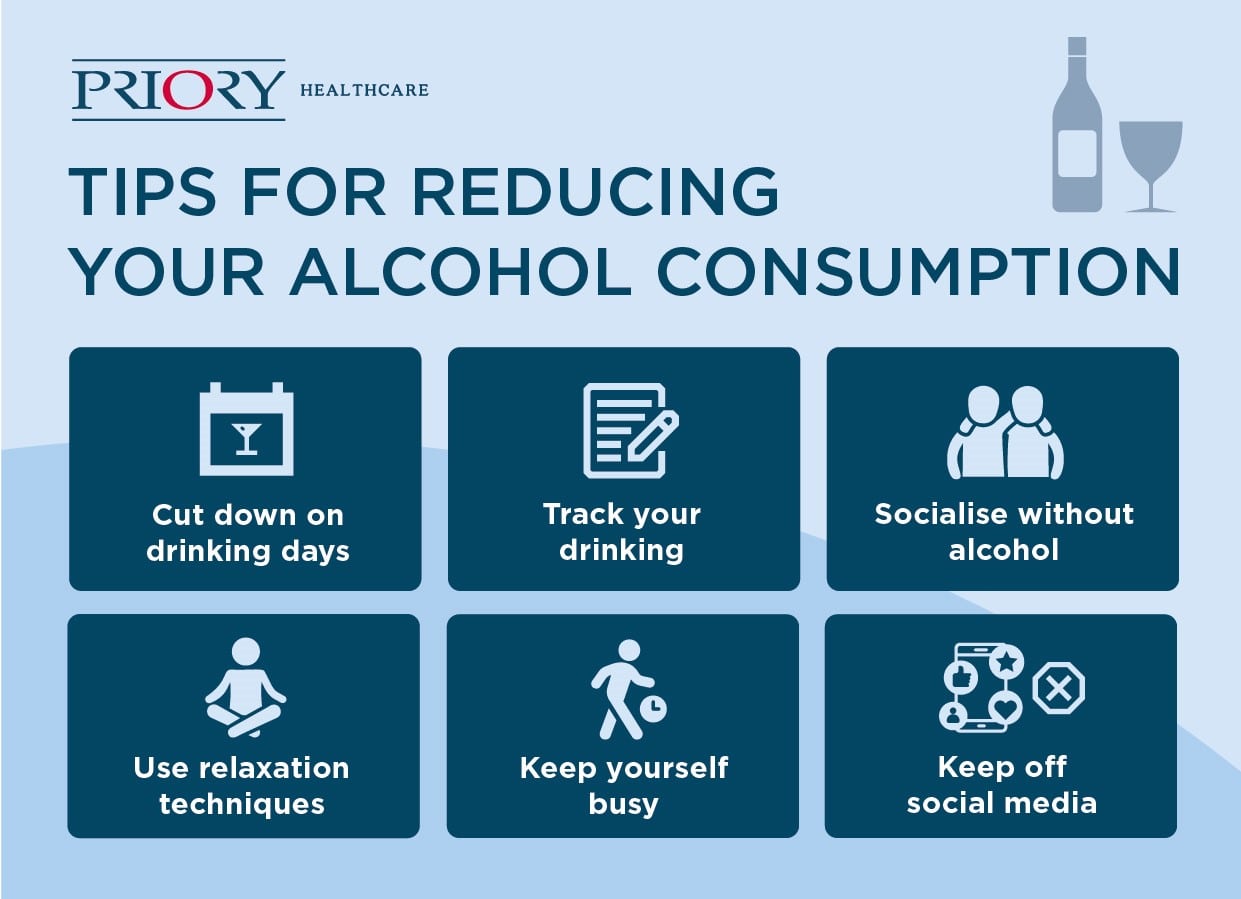How to cut down on alcohol: Simple steps to follow
Once you’ve recognised you need to cut down, make a plan to identify triggers and use strategies like goal setting to keep you on track.
Once you’ve recognised you need to cut down, make a plan to identify triggers and use strategies like goal setting to keep you on track.



Alcohol is a widely consumed drug used socially by the majority of the population. It makes it easy to forget that it’s addictive, it’s damaging to health and it can negatively affect our relationships and wellbeing.
Deciding to cut down on alcohol is a positive step that can be life-changing. How you choose to cut down will vary from person-to-person. Experimenting with different strategies can help you figure out the best plan for you in order to stick to your long-term goals.
Surveys from the NHS show that alcohol consumption is decreasing. Many people are choosing to cut back or quit drinking because they notice signs that their alcohol intake is negatively affecting them.
Signs you might be drinking too much include:
Self-reflection when it comes to your alcohol use and how it’s affecting your life may be the key to figuring out what’s right for you. How might you answer the following questions?
Reflecting on these questions and answering them honestly can provide valuable insight and help you take the first steps towards a healthier relationship with alcohol.
Handling triggers (something that leads to you having a drink) can be challenging. If you can recognise these in advance and think about how you’ll manage them, you’ll be able to stay in control when they do arise.
Common triggers for drinking alcohol can stem from emotional, social, situational and environmental factors. Emotional triggers like stress, anxiety, sadness, or even boredom and celebration, often prompt drinking as a coping mechanism or reward.
Social situations can also play a significant role, especially during parties or gatherings, as peer pressure and the desire for connection arise. Certain activities, routines or places, like unwinding after work, watching sports in a group or being at a bar, may be situational triggers. Environmental cues like seeing, smelling or being around alcohol can also amplify cravings.
If you notice that your emotions can be triggers for drinking, try healthier outlets for your emotions, like hobbies or creative pursuits. Try managing stress through exercise, deep breathing work, meditation, journaling or talking about how you’re feeling with a trusted friend.
If social situations are an issue, choose activities that don’t revolve around drinking. If this isn’t possible, opt for non-alcoholic drinks in social settings. You may need to set boundaries and plan your responses to peer pressure in advance if you think this might be an issue.
Ask yourself “what purpose is this drink serving me?”
Am I Hungry?
Am I Angry?
Am I Lonely?
or am I Tired?
And is there a better way of fulfilling that need rather than having a drink?
Dr David McLaughlan, Consultant Psychiatrist at Priory Hospital Roehampton
Avoid environments strongly associated with alcohol, when possible, if situational or environmental triggers are an issue. Instead, replace drinking with healthier habits like having tea, exercising or taking part in your favourite hobbies and activities.
Minimise your exposure to alcohol by keeping it out of sight at home and make sure you have plenty of non-alcoholic options available.
It’s not always possible to avoid alcohol, particularly when it comes to social events. In this case, you’ll need to plan ahead. Research non-alcoholic options such as soft drinks and mocktails. Make sure you know what to order. Order a taxi home before you head out so can get out before things could get out of hand.
Setting goals and creating a structured plan for cutting down on alcohol can help you to stay on track.
SMART goals are comprehensive ways to set realistic targets. SMART stands for Specific, Measurable, Achievable, Relevant and Time-bound. Example SMART goals that you may wish to set for yourself include:
Keeping on top of your drinking is easier when you feel in control. If you’re able to make changes to your environment, particularly when you’re interacting with friends or attending social events, you’re less likely to drink as much.
Try suggesting alcohol-free social events with your friends. Going to the cinema, playing sports together, going for breakfast dates instead of evening meals, going for walks, or visiting a museum or gallery are all good options.
Don’t keep any alcohol in the house. If you do have friends round who drink, an absence of alcohol will limit the options for you all. Instead, supply interesting alcohol-free alternatives.
If you do go out and there’s alcohol at the event, come up with a get-out plan in advance so that you can stay in control. It’s worth stressing that willpower lessens throughout the day, so making a plan ahead of time is worth the effort.
Prepare your answer to questions about why you’re not drinking. You might want to give a reason ("I’m driving tonight”), respond with humour ("I’m keeping my dancing feet steady tonight!") or just say you don’t want to drink today - remember, you’re in control and just saying ‘no’ is a perfectly acceptable thing to say.
If you’re choosing not to drink alcohol then what are your options? 17 to 23% of Brits don’t drink, according to DrinkAware, so you’re in good company. There have never been more options for replacing alcohol in daily life and when socialising.
There are lot of tasty non-alcoholic drinks on the market today. If you’ve cut down on your alcohol intake but are still drinking occasionally, consider mindful drinking.
This is a way of noticing more about how and what you’re drinking. For example, sip your drink, savouring each mouthful - what does it taste and smell like? Is it fizzy or still? Warm or cold? Then, focus your attention on how alcohol makes you feel. What physical changes do you notice? What happens to your mood? Do you have a sense of how your connections with others are affected by alcohol?
Some people feel that reducing or eliminating alcohol from their life leaves a gap. Rather than focusing on what’s missing, think about ways you could fill that gap. You might have more time, more energy and more money. Use these newfound resources to find new hobbies or revisit old ones.

Cutting down on alcohol can be daunting so it's important to think about how you might handle challenges and stay motivated.
While setbacks do happen, it’s important to have self-compassion and treat yourself kindly. Persistence is more important than perfection, so don’t let setbacks undo all your hard work. Move on and keep going.
Staying motivated isn’t always easy. Keeping a list of the benefits you’ve noticed since cutting back (for example, better sleep, more energy, money saved) can bolster your resolve when motivation wanes.
Don’t forget to celebrate your progress! Recognising your achievements, like reaching a milestone without alcohol, is worth celebrating and keeps you motivated.
If cutting down feels too difficult to do alone or if you’re experiencing withdrawal symptoms from alcohol, it’s important that you reach out for professional help. Our alcohol test can also help clarify where you are and what you need to do next.
Support groups such as Alcoholics Anonymous (AA), Al-Anon or Families Anonymous (Famanon) offer advice, support and empathy.
There are many apps that are designed to support people who want to cut down on alcohol. The free NHS app is called Drink Free Days and has a function allowing you to pledge a certain number of days off alcohol.
If you’re a friend or family member looking to support someone who’s trying to reduce their alcohol consumption, have a look at our guidance on how to help an alcoholic.
